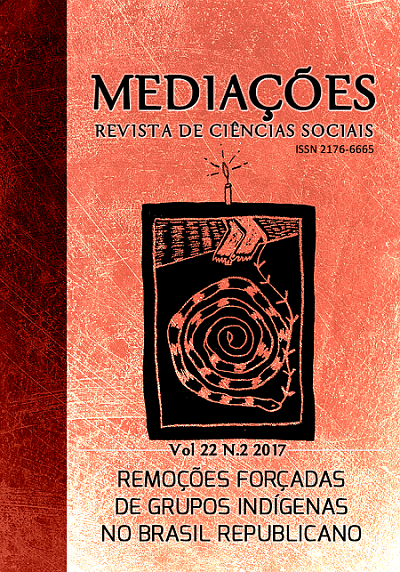Forced evictions of indigenous groups in republican Brazil
DOI:
https://doi.org/10.5433/2176-6665.2017v22n2p13Keywords:
Indigenous groups, Land expropriation, RepublicAbstract
In 2017, 50 years have passed since the conclusion of the Figueiredo Report, an extensive set of documents produced during the military regime (1964-1985) by attorney Jader Figueiredo Correia, in response to the request of the Minister of the Interior, General Afonso Augusto de Albuquerque Lima. In this very important source for various types of research, there are, rawly exposed, several reports of genocidal actions promoted against indigenous communities. These are activities that deeply mark Brazil's recent history, especially the official indigenous policy in part of the republican period. All volumes of the Report exceed 7 thousand pages, in which reports of massacres, seizures, illicit land leasing, intimidation, threats, torture, poisoning, rape, murder, slave labor, fraud and theft of indigenous heritage, among other forms of violence promoted against indigenous peoples. The crimes took place across the national territory, from North to South, and the facts reveal much about the origin of private land ownership over vast expanses of Brazil and the enrichment of certain local elites.Downloads
References
BAINES, Stephen É a FUNAI que sabe: a frente de atração waimiri-atroari. Belém: Museu Emílio Goeldi. 1991. (Coleção Eduardo Galvão).
CNV. Violação dos direitos humanos dos povos indígenas. In: CNV. Relatório da Comissão Nacional da Verdade. Brasília: CNV, 2014, v. 2, p. 197-256.
DAVIS, Shelton. Vítimas do milagre. O desenvolvimento e os índios do Brasil. Rio de Janeiro: Zahar Editores, 1978.
LIMA, Edilene de; OLIVEIRA, Jorge E. de. Remoções forçadas de grupos indígenas 23 In: DUTRA, Carlos Alberto. O território ofaié pelos caminhos da história. Reencontro e trajetória de um povo. 2004. Dissertação (Mestrado em História) - Universidade Federal do Mato Grosso do Sul, Dourado, 2004.
LEINER, Piero. O exército e a questão amazônica. Estudos históricos, , v. 8, n. 15, p. 119-132, 1995.
LIMA, Edilene Coffaci; PACHECO, Rafael. Justiça de transição e povos indígenas: reflexões a partir do caso Xetá. Revista de Direitos Humanos,Aracê, v. 4, p. 219-241, 2017.
MAMED, Danielle; CALEIRO, Manuel; BERGOLD, Raul. Os Avá-Guarani no Oeste do Paraná: (Re)Existência em Tekoha Guasu Guavira. Curitiba: Letra da Lei, 2016.
MORAIS, Bruno Martins. Crônicas da territorialidade Kaiowá e Guarani nas adjacências da morte. São Paulo: Elefante, 2016.
OLIVEIRA, Frederico C. B. Quando resistir é habitar: lutas pela afirmação territorial dos Kaiabi no baixo Teles Pires. Brasília: Paralelo. 2015.
SILVA, José Afonso. "Parecer", MS, 2015. Disponível em: goo.gl/JXA2On . Acesso em: 14 de nov de 2016.
Downloads
Published
How to Cite
Issue
Section
License
Copyright (c) 2017 Edilene Coffaci de Lima, Jorge Eremites de Oliveira

This work is licensed under a Creative Commons Attribution 4.0 International License.
Copyright on articles published in Mediações belongs to the author(s): in the case of partial or entire republication of the original publication, we ask author(s) to indicate the original publication in the periodical.
Mediações uses the Creative Commons Attribution 4.0 International license, which allows Open Access, enabling any user to read, download, copy and disseminate its content so long as adequately referenced.
The opinions expressed by the author(s) are their sole responsibility.

































